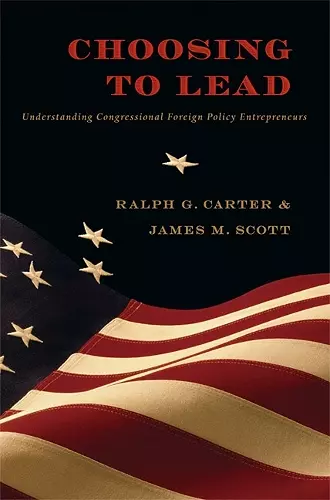Choosing to Lead
Understanding Congressional Foreign Policy Entrepreneurs
James M Scott author Ralph G Carter author
Format:Paperback
Publisher:Duke University Press
Published:3rd Jul '09
Currently unavailable, and unfortunately no date known when it will be back

Assesses Congress's role in US. foreign policy making
Assesses Congress' role in US foreign policy making.Shedding new light on how U.S. foreign policy is made, Ralph G. Carter and James M. Scott focus on “congressional foreign policy entrepreneurs,” the often unrecognized representatives and senators who take action on foreign policy matters rather than waiting for the executive branch to do so. These proactive members of Congress have undertaken many initiatives, including reaching out to Franco’s Spain, promoting détente with the Soviet Union, proposing the return of the Panama Canal, seeking to ban military aid to Pinochet’s regime in Chile, pushing for military intervention in Haiti, and championing the recognition of Vietnam. In Choosing to Lead, Carter and Scott examine the characteristics, activities, and impact of foreign policy entrepreneurs since the end of the Second World War. In so doing, they show not only that individual members of Congress have long influenced the U.S. foreign policy-making process, but also that the number of foreign policy entrepreneurs has grown over time.
Carter and Scott combine extensive quantitative analysis, interviews with members of Congress and their staff, and case studies of key foreign policy entrepreneurs, including Frank Church, William Fulbright, Jesse Helms, Edward Kennedy, Pat McCarran, and Curt Weldon. Drawing on their empirical data, the authors identify the key variables in foreign policy entrepreneurship, including membership in the Senate or House, seniority and committee assignments, majority or minority party status, choice of foreign policy issues, and the means used to influence policy. By illuminating the roles and impact of individual members of Congress, Carter and Scott contribute to a more nuanced understanding of the broader U.S. foreign policy-making process.
“I now see the foreign policy-making process in a different light than I did before reading Choosing to Lead. Ralph G. Carter and James M. Scott show that Congress can and regularly does play an important role in foreign policy making. In the future, foreign-policy analysts will have to consider that role rather than assume that only the Oval Office matters.”—A. Cooper Drury, author of Economic Sanctions and Presidential Decisions: Models of Political Rationality
“Two scholars reveal here the fascinating stories of enterprising American lawmakers who’ve exerted extraordinary personal influence in the making of American foreign policy. Sometimes unnoted in contemporary writings and occasionally unappreciated, some were surprisingly successful and some stunningly selfless. Choosing to Lead is historically significant and interestingly written.”—Jim Wright, Former Speaker, U. S. House of Representatives
ISBN: 9780822345039
Dimensions: unknown
Weight: 458g
312 pages